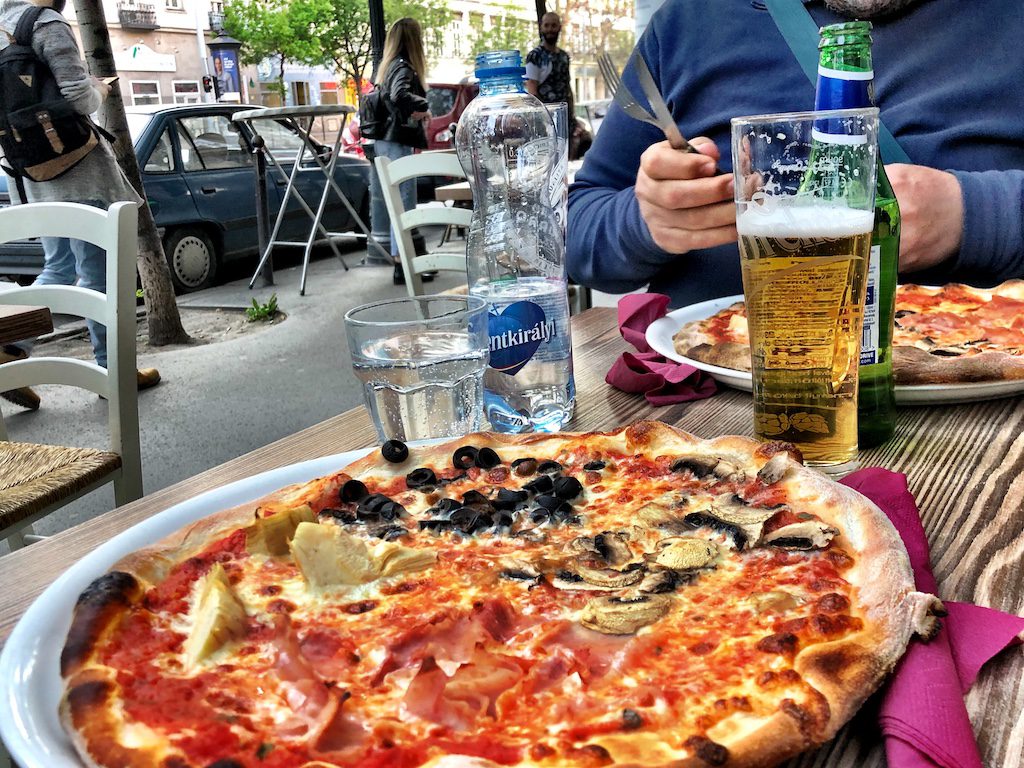Budapest Diary

I just made it home from having dinner al fresco with a Sicilian friend from church. He took me to an Italian place he likes. I had my first Dreher beer of this Budapest trip. Dreher is a Hungarian brand, founded by Anton Dreher, the Austrian who invented Vienna-style lager. They say it “dree-herr”. Anyway, the food was good, and as we left our table to walk home on this cool night, my Sicilian pal saw sitting behind us a woman who was a former colleague at a company in Budapest. She is Hungarian, but speaks Italian. Off they went chatting in his native tongue. It fell to me to talk to her dining companion, a Hungarian whose name I won’t use, just to be on the safe side. I’ll call her Eva. My good fortune — she turned out to be really interesting.
Eva, who must be in her late twenties or early thirties, talked about how frustrating the Covid crisis has been — nothing surprising there. Eventually we got around to talking about politics, just general things. She said that she has grown weary of the Orban government, “but the Left, my God, they are really crazy. They have nothing to offer — they just oppose whatever the government supports. We could stand to have a smart opposition here. The government has a two-thirds majority in the Parliament, which means that they can do whatever they want. That’s not good for them, and it’s not good for democracy. But the Left is hopelessly bad.”
She works for an international business, and said she had lived for a few years in England, but got out in part because she was so wearied by the social tension. “The racial stuff was bad,” she said. “Over and over, black people in England kept telling me how privileged I was. I told them, ‘Do you know that I come from a country that was communist? Nobody had anything!’ None of that mattered. All they could see was that I am white, and that meant I am guilty.”
I told her about my recent book, and that this was exactly the kind of thing that made people in the US who had lived with Communism and gotten out say that a form of totalitarianism is emerging in America. The idea that your individual guilt or innocence doesn’t matter, that only your class, or your race, or some other characteristic, determined whether you are Good or Evil — that was how it was under Communism, and that’s how it is becoming in the West.
“Absolutely,” she said. Then she told me that her family had owned land in the countryside, and were prosperous farmers (“They were like kulaks — do you know the word?”). They had everything taken from them when the Communists took over. Her grandfather buried the family jewelry somewhere on the farm, but forgot about where. One of the neighbors knew he had buried it, and informed the police. They marched him around the farm with a gun to his head, ordering him to show them the jewelry, but he genuinely couldn’t remember. He did a couple of jail terms, she said. The family lost everything.
“Every family in this country has a similar story,” she said.
Eva said that it grieves her that so few people today know what Communism was, and how many lives it destroyed. This is why a version of it is coming back. I could have talked to her all night. She told me that she had once been in Australia, and was tasked with organizing an event for Hungarians who had fought in the 1956 rebellion against Soviet occupation. These ’56ers were heroes to her, and it was a privilege to do this to honor them. Eva said that they all came up to her afterward, expressing their gratitude with high emotion. They were just so pleased that what they had gone through, and what it meant, had not been forgotten. Their reaction overwhelmed her, Eva said, and made her proud to have taken part in giving something back.
UPDATE: I should have added this. On the long walk to our neighborhood, the Sicilian mentioned that he was leaving later this week for another EU country to look for work. Now that you’re leaving, what do you think of Budapest? I asked.
“It’s a beautiful city. It’s not like so many other European cities. If you go to Rome, it looks like the Third World on the streets. We don’t recognize our own countries anymore. These immigrants keep coming. Nobody wants them there, but nobody stops them.”
I brought up the letter that twenty retired French army generals had signed, warning of civil war in France over Islamist control of suburbs. Do you think civil war is possible in France? I asked.
“France, I don’t know. It is possible in Italy.”
“But you don’t have the Islamist problem that France does.”
“No, but a civil war in Italy would be fought for different reasons. If you go to Rome, you will see police with machine guns everywhere. It’s the same in other cities in Europe.”
“Yes, a reader of my blog posted in the comments a photo he took outside of his window in Brussels. It showed two soldiers, or maybe police officers, with machine guns. You don’t see that in the US. But then, we don’t have the problem with radical Islam that Europe does.”
“You will see the same thing in my town in Sicily,” he said. “Do you think we have Islamic terrorism in Sicily?”
“I guess not.”
“Those police with the big guns are not there to protect us from Islamists. They are there to protect government officials from the people.”